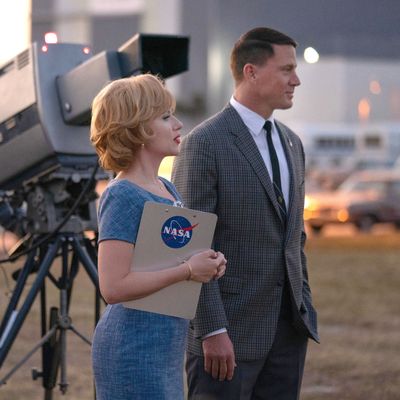
Fly Me to the Moon could probably be funnier, or more romantic, or more visually resonant, but it’s so charming and well acted that we might not notice. Set during the Space Race of the 1960s, at a time when NASA was struggling to hang onto its legitimacy in the wake of major early setbacks, the film also takes its share of liberties with some of the facts. So, not quite a history lesson and not quite a rom-com and certainly not an epic, the movie is a mild but pleasant mishmash of genres held together by the sheer charisma of Channing Tatum and Scarlett Johansson, two actors who seem unexpectedly well suited to each other’s energies.
Johansson plays Kelly Jones, a slick Madison Avenue advertising executive who when we first meet her is pretending to be pregnant while sweet-talking a group of Ford executives into a proposed campaign highlighting newly installed seat belts in their Mustangs. She is so expert at adopting different accents and attitudes, and so willing to make up stories about herself, that we suspect early on that Kelly might not even be her real name. Sure enough, she’s soon approached by Moe Berkus (Woody Harrelson), a shadowy figure from the newly elected Nixon administration, who wants her to go down to Florida and provide a little public-facing pizzazz to the moribund, not-ready-for-prime-time geeks at NASA, who are about to lose their congressional funding. Kelly doesn’t want to do it, but Moe knows things about her past — initially kept vague to us — so that she’s, uh, compelled to accept.
Kelly’s new duties put her in direct conflict with Cole Davis (Tatum), the launch director of the upcoming Apollo 11 moon mission. With his seriousness of purpose and awkward demeanor, he can’t quite wrap his head around some city slicker trying to sell the Space Race to the public with product placements and advertising partnerships, all the while trying to coo at and woo reluctant senators into not cutting off the agency’s funding.
We might expect more sparks between the two after Cole admits to Kelly, the very first time they meet, that he’s smitten with her. But there’s a long way to go before anybody actually makes the first move. We spend a lot of time watching these two attempting to get along as they strive to keep the Moonshot on track and on target. On paper, this should be a problem: We basically know the outcomes of all these story strands, both the fictional and nonfictional ones. But we can’t take our eyes off the two stars. Tatum’s manly physique has never exactly screamed “science and math nerd,” but we buy him as a NASA honcho: a decorated pilot and resolute ’60s square with a steely sense of mission. His awkward solidity plays well off Johansson’s calculated bubbliness. Each speaks and moves at a different pace as the other attempts to keep up.
There’s also a subplot, much highlighted in the film’s trailers but introduced surprisingly late in the picture, about Kelly’s efforts to create a fake version of the moon landing, a scheme code-named “Project Artemis,” meant as a fail-safe in case the real mission goes awry. Rose Gilroy’s script never does an adequate job of explaining how exactly this is supposed to work, and even a big, admittedly funny set piece involving the moviemaking clusterfuckery of Project Artemis raises more questions than it answers.
Still, we understand why this plot point is probably there. With a setup whose outcome is already a matter of history, some fictional element was presumably required to create suspense and give the story some Hollywood-friendly shape. (In case you’re worried about “platforming” conspiracy theories: Rest easy, the movie doesn’t suggest that the moon landing was a hoax.) Besides, director Greg Berlanti and his supporting cast have great fun with the comic shenanigans of a fake landing being created alongside the real Apollo mission. Jim Rash, as the egomaniacal commercials director Lance Vespertine, hired by Kelly to helm the show, appears to be having the time of his life, and he passes that delight to us as well. We might even forgive that he’s playing one of cinema’s sturdiest and most predictable stereotypes: a variation on the flamboyantly gay creative director.
Berlanti has had great success in television, and while Fly Me to the Moon shouldn’t have been a TV show, it does at times feel like it wants to be one, with its awkwardly timed subplots and its episodic box-checking. And it never really captures the cinematic splendor of the Space Race. One evening, Cole’s assistant flight director Henry Smalls (Ray Romano) shows Kelly the Apollo launchpad in the distance. “I’ve been looking at this view every day for eight years,” he says in evocative fashion: a distant twilight reverie that these people are endeavoring to make real. There’s much talk throughout the film of how the Space Race allowed America to dream again at a time of war and political turmoil. But the film barely gives this idea time to work its power on us; it feels like the result of a dialogue polish, not an actual underlying sensibility. And when Cole takes Kelly for a night flight in his prop plane, we’re supposed to feel the awe and tenderness of the moment. But it really is just a moment, visually undistinguished and not particularly romantic. The movie is somehow too long, and yet it never quite breathes, preoccupied as it is with hitting story points and character notes. And yet, and yet, and yet … Whenever Johansson and Tatum are onscreen, there’s clearly magic there.
More Movie Reviews
- The Accountant 2 Can Not Be Taken Seriously
- Another Simple Favor Is So Fun, Until It Gets So Dumb
- Errol Morris Has Been Sucked Into the Gaping Maw of True Crime


